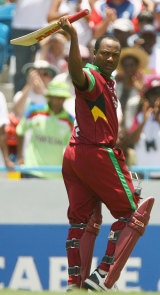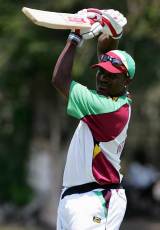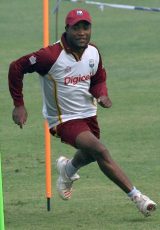'I didn't short change anyone' - Lara
While Brian Lara continued to score runs West Indies slipped inexorably into decline. He had three stabs at captaincy but could not arrest the slide. A woeful World Cup campaign led to a sudden retirement. John Stern caught up with him in London
|
|

|
Meeting Brian Lara is a confusing experience. He is charming and suspicious in equal measure. He is articulate and plausible in everything he says but his is only one side of the story. Much of what he says is self-justifying and, when it comes to the big issues, he is strong on rhetoric and light on detail. It sounds like the sort of thing you would hear from Tony Blair.
His personal achievements are unarguable but, like Blair, history may judge him harshly. In Trinidad he will continue to be deified; elsewhere he may be remembered as the man who led West Indies into a slump from which there is little immediate sign of recovery.
Brian Lara returns from the hotel bar with a white wine and a mineral water. The wine is his. It is three in the afternoon. "I've retired," he says with a twinkly smile. The following day West Indies will be playing at Lord's. Lara will be there but in a suit rather than whites. The ground will be sold out but how many bought tickets hoping to see Lara's last Test at Lord's? There is an air of disappointment, one that Lara clearly shares.
He expected and hoped to be playing but claims he left West Indies cricket on his own terms when he retired abruptly at the World Cup. It is hard to believe. "We needed a new direction, someone who was willing to see some sort of change," he says. "I was willing to do that. I wanted to come to England but I had also said I wanted to finish with one-dayers. It's not ideal but then how many things in life are?"
Lara is reticent to begin the interview until the arrival of his lawyer. So we stand in the lobby of this swanky central London hotel making small talk. He asks more than once whether I have a list of questions. He is accompanied by two agents and a friend from Trinidad with whom Lara laughs and jokes. He has a dilemma, whether to attend Saturday's FA Cup final at Wembley or play golf and go to Lord's. He muses that he will probably give the football a miss, saying rather oddly: "I'm not much of a sports fan."
There is still no sign of the lawyer, so I suggest we just crack on. Lara is still wary of what subject matter is up for discussion. We had originally asked Darcus Howe, the Trinidadian writer and broadcaster, to conduct the interview, a plan that was vetoed by Lara at the last minute.
Once we get going, he is chatty - polished, guarded and measured but chatty nonetheless. Every now and again he comes out with a word that one hardly expects a sportsman to use. "Vicariously" and "reciprocity" flash into the conversation out of nowhere like his lightning cover drives.
He uses the latter of those words when talking about his friends in cricket. He mentions that he is hoping to meet Shane Warne that evening. When pressed on who his friends are in the game in or out of the Caribbean , he says: "I have a lot of people I respect and a lot of people I have time for - reciprocity isn't necessary."
|
|
At one point Lara spills his white wine, the glass slipping off the curved edge of this trendier-than-thou glass coffee table in the hotel lobby. Lara looks at the table as if it were a two-paced pitch at Sabina Park.
Asked about the favourite moments from his glorious career, he picks out team achievements with seeming deliberation, specifically the world-record chase of 418 against Australia in Antigua in 2002-03 and the unlikely Champions Trophy victory at The Oval in 2004. When I bring up his astonishing reflex catch to dismiss Andrew Flintoff in that game he practically affects not to remember it. "It's the game, not the catch," he says with a laugh, as if to stress that, contray to widely held opinion, he is a team man and not an egotist obsessed with batting records.
No one questions Lara's ability as a batsman. Indeed, at the risk of alienating millions of Indians, I would give my last tenner to watch him bat rather than Sachin Tendulkar or anyone else from the last decade. With Lara there is a sense of uncertainty - the whole 'flawed genius' cliché. He is essentially more human and more individual than Tendulkar. They have shared unreasonable burdens of expectation but Tendulkar is perhaps fortunate that he has had other stars around him. Lara has been carrying the West Indies team for the best part of a decade. He has had three spells as captain, almost by default, as the best player, not because he is especially well equipped to do the job.
The impression he gives is of fighting a losing battle. "It's a cliché that cricket is the only unifying force in the Caribbean ," he says. "It is but there are a lot of other factors that keep us apart. Success in sport and war will always unite but you need to have a greater foundation and greater core. That has been tested through the decline of West Indies cricket and we've seen how divided we are as a people. Why do I need a passport to go to Jamaica or Barbados?" Perhaps the question is not why are West Indies so poor now but how was it that Frank Worrell and Clive Lloyd managed to lead such successful sides when they did.
Lara believes West Indies' problems run deep. "Cricket has been diluted by the fact there are other options for kids now but that's a good thing," he says. "That's not where the problem lies. It's that we don't have a good infrastructure for young guys to develop. West Indies have a great Under-15 side. I know a 16-year-old guy in Trinidad who's awesome but I worry for him because of the facilities. A mediocre Australian cricketer at 17 or 18 will be slapping everyone all over the world five years later. If you don't have facilities and you don't have employment, then you have a negative atmosphere."
|
|

|
Lloyd said in last month's TWC that the current West Indies players "don't appreciate the importance of what they represent". Much more aggressive interpretations of this sentiment have been spouted by all manner of former West Indies greats in recent times. When I put Lloyd's comment to Lara, I expect him to be dismissive. But he warms to the theme: "If you provide it [the history], then the guys will catch on to it. It's fine to say you've got to understand this or read this. This stuff should be taught at youth level, so the history of West Indies cricket is embedded in them. Drum it into them so they have no choice."
Lloyd was probably referring to Caribbean history and culture as a whole rather than just cricket. It is a generational thing. As time passes and the Caribbean leaves its colonial past further behind, the question of nationality and 'what you represent' becomes less clearly defined. Britain , on the other side of the post-colonial fence, is grappling with similar issues.
When Mike Atherton asked Lara whether he had any words for the crowd after his final match for West Indies , Lara leaned into the microphone, smiled and then turned to look at the stands: "All I want to ask is, 'Did I entertain?'" The words were greeted by rousing applause and cheers. It sounded as if he was copying Russell Crowe's Maximus ("Are you not entertained?") in Gladiator. Lara laughs at the suggestion.
"What you have to understand is that the first day I picked up a bat I made an impression on my older sister Agnes and my dad. It was about seeing people satisfied by what you're doing. I was creating a fan base."
Lara's sister Agnes had seen a newspaper advert for a coaching clinic, so sent the six-year-old Brian along. "People would say I was like a young Roy Fredericks, so I copied him right down to the buttoned-down sleeves and the little hat."
Entertainment is high on the Lara list of priorities. "It's important for all today's sportsmen to realise that the guy who's paying to come through the turnstile is the guy who should mean a lot to you; those are the people who need to be entertained. It's great to win for your country and be competitive but at the end of the day you want people to leave happy."
To win or to entertain is a dilemma for the professional sportsman. A few manage both, plenty manage neither. Lara has entertained, for sure, though his unbeaten 400 in Antigua seemed less like vintage batting than a self-serving attempt to prove a point after a poor series.
There is a sense that the entertainment factor was something that Lara could control himself, the performance of his team something that he couldn't or at least felt he couldn't. Lara proudly says, "I've done things my way" - which can cover a multitude of perceived sins, whether it be selfish batting, eccentric tactics or uninspiring leadership.
"If a man wants to fault me, then fine. But respect me for trying and that I didn't short-change anyone. It [the criticism] doesn't rest heavy with me. People get so caught up in it, they have their own issues. I am less burdened by it."
|
|

|
Does he feel fulfilled? "I've done what I could do, so I'm happy with me. As a team, we've not been able to climb out of the doldrums, so that will remain on my mind. That does not rest well with me. I leave West Indies cricket with my head held high. I've tried my best and I've worked my arse off. Maybe I could have done things differently but I've done things my way. That's the most important thing."
So what does Brian Lara do next? He talks confidently and enthusiastically, if vaguely, about projects in Trinidad to build recreational facilities for disadvantaged communities. "My focus now is on the majority, not the elite," he says emphatically. He is not planning a media career even though he talks better than many commentators and pundits. He probably knows he would end up criticising people. He almost certainly has opinions worth sharing. But he is too canny to put himself in a compromising position. His plans sound impressively worthy but it is hard to see how they will occupy him for long.
At the start of the interview he said he was "finished" with cricket. Is that really true? He smiles. "I think I am going to play cricket again. If I go six or eight months without cricket, I would lose it and I don't want to lose it yet." When I probe him about who he might play for, he avoids eye contact, smiles thinly and looks over my shoulder into the bar, where his agents and lawyer are talking. Lashings? "No, no," he says, laughing. County cricket? The new Indian breakaway 20-over league? He is not saying, as if enjoying the secret and suspense. But one way or another Brian Lara will be back. We may even be entertained again.
John Stern is editor of The Wisden Cricketer
